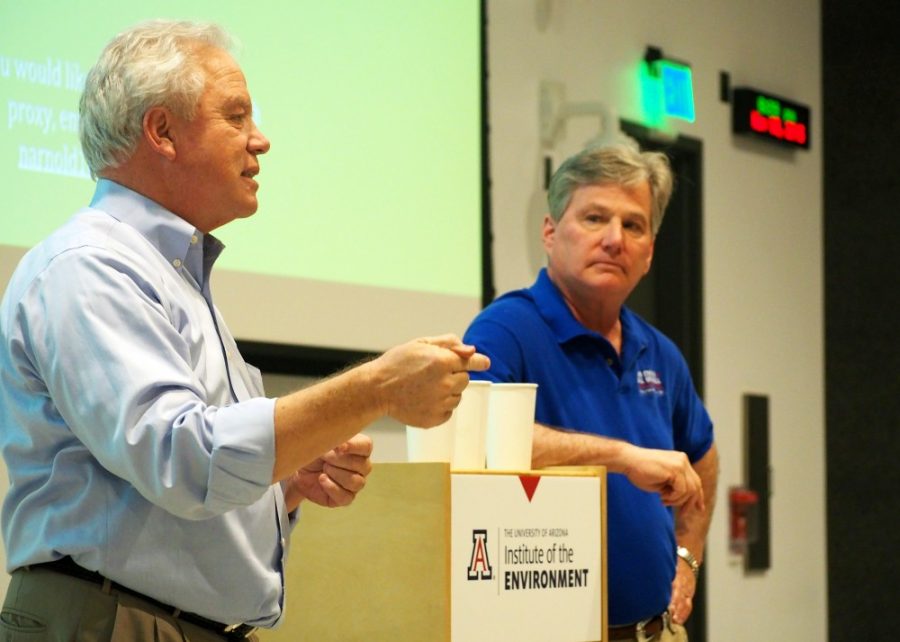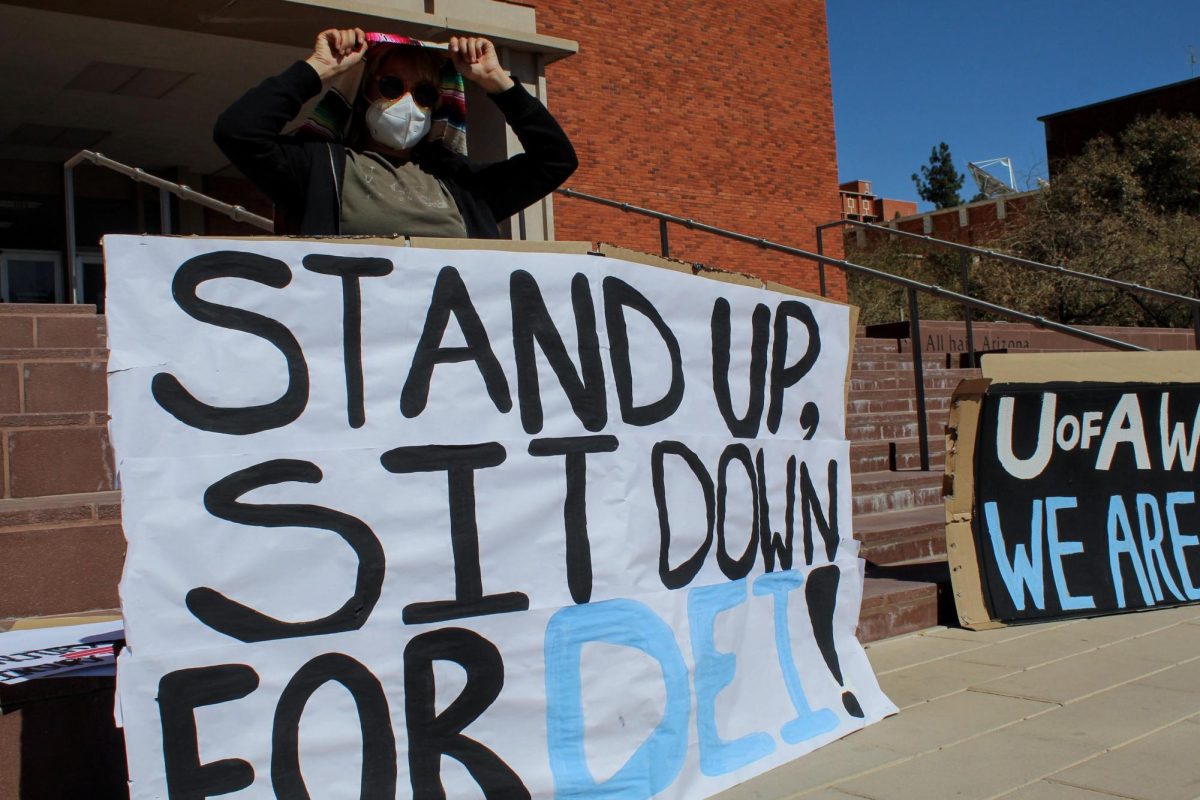Arizona voters will have the opportunity to help make a decision on Tuesday over a race that could influence the price of electricity bills in the coming months.
The two democratic candidates for the Arizona Corporation Commission spoke about the significance of Tuesday’s election to a group of students at the Environmental and Natural Resources 2 building Thursday evening.
The ACC sets regulations for private energy companies like Tucson Electric Power and Arizona Public Service and is endearingly referred to as the fourth branch of the Arizona government. Their purpose is to hold these private companies responsible and look out for the interest of the people these companies serve.
“The role of a commissioner is to have the backbone to stand up to politically powerful monopolies and order them to do things they may not want to do. An order signed by the commission is the same as one signed by a judge,” said Bill Mundell, one of the democratic candidates.
RELATED: Students for Sustainability protest TEP’s proposed rate hikes
The UA Students for Sustainability and Arizona Institute for Energy Solutions hosted the meeting and originally intended for it to be a debate between the five candidates running: Two democrats and three republicans. All five candidates were formally invited, but only the two democratic candidates came.
The commission consists of five members: Four commissioners and one chairman. Arizonans will vote on five candidates running for three open seats this election. If the three republican candidates win, they will control the commission. The two democratic candidates hope to keep that from happening.
Those two candidates, Bill Mundell and Tom Chabin, decided to run for the position when they saw what they described as dirty practices going on within the ACC. They claim two of the republican candidates have been “bought and paid for” by the Arizona Public Service company.
“I think it speaks volumes that our opponents aren’t here tonight to speak with you,” Mundell said.
In 2014, APS allegedly spent $3 million in dark money to elect two republicans to the commission. However, they have been tight-lipped about the campaign contributions, which have led to an on-going FBI investigation, as well as an investigation by APS parent company, Pinnacle West Capital. Sitting ACC chairman Bob Burns vied for an independent investigator funded by the commission, but republican incumbent Andy Tobin opposed his efforts.
This year, APS has spent $3.4 million funding the republican candidates campaigns with the sole purpose of defeating Chabin and Mundell, according to Chabin, and their reason for doing so spells bad news for the people of Arizona.
The candidates pointed to the fight between Elon Musk’s renewable energy company SolarCity and APS. SolarCity wants to build solar gardens on residential rooftops so people can supply themselves and others with solar energy while the APS electric company wants to build solar plants and then charge the public to use that power.
Musk’s company has invested $2 million to fund Mundell’s campaign here in Arizona. SolarCity is concerned if the republican candidates win, their hopes of supplying people with rooftop solar panels with be grounded.
According to Mundell, as recently as a year ago, seven to eight hundred new solar gardens were being added to residential houses each month in Arizona. But after Arizona electric companies intentionally added large hookup fees, the rate went down to about five to ten a month.
“We at SolarCity are terrified that we will lose our jobs if Tom and Bill do not get elected,” said Tim Sultan, a field energy consultant for SolarCity in Tucson.
He said there are over 250 SolarCity employees in Tucson anxiously awaiting the results of this election.
Mundell said the electric companies are clever and know what they are doing. He said they have a hand in the race because they want to be the only game in town to have control over how much people pay for their electricity.
“If they don’t have to build solar power plants and homeowners are putting solar on their roofs, then they should not be able to raise everyone’s rates,” Mundell said. “That’s why we are fighting tooth and nail against this antiquated model.”
Chabin called it an “issue of business model for utilities” and said we have to decide how we want our new emerging energy technology to be used and regulated.
“Solar energy lowers the total cost for everyone, there is no reason we should pay more,” said Savannah Salazar, a Students for Sustainability committee member.
According to Chabin, the ideal situation is during the day when a homeowner’s solar panels are producing more power than the home is consuming, that extra power will go down the line to the next house. And then at night, when there is no sun, the consumer can use as much electricity from the power plant as their panels gave away during the day at no additional charge.
However, Mundell said the electric companies want nothing to do with this. Not only do they want to add fees for people using their own solar panels, but they fought against the Arizona law requiring them to produce 15 percent of their energy from a renewable source by 2025.
The candidates pointed back to the 2014 ACC election.
“The FBI subpoenaed records and is investigating the election two years ago where APS put $3.2 million of dark money into the race,” Chabin said.
However, the commission canceled the subpoena and thwarted the FBI’s efforts to investigate what was going on. According to Mundell, the first thing both democratic candidates would do if elected would be to sign the subpoena so the records could be accessed and they could expose APS.
RELATED: Dakota access pipeline rally: Stand in solidarity with Standing Rock
Mundell believes the candidates picked during that election do everything the electric companies want them to do.
Burns also wants to investigate the records and would be willing to sign the subpoena. If Chabin, Mundell and Burns get elected, the three of them would gain the majority vote on the issue and be able to access the records.
Despite knowing this, APS still funds Burns’s campaign. Chabin said the APS knows Burns will get elected either way and they have no choice but to support him as a republican candidate even though he is the one republican not looking out for their interests.
Mundell said the people of Arizona need a commission that will work for the people of Arizona and not just the checkbooks of these private electric companies.
“We need a commission that will make decisions based on each individual situation and not just rubber stamp all the requests,” Mundell said.
According to Chabin, all five of the candidates are within a few points of each other in the latest polls. Burns leads with 23.3 percent with Tobin following at 22.2 percent and Chabin at 20 percent, according to an Insight Consulting poll.
Republican candidate Boyd Dunn is close behind with 19.8 percent, while Mundell sits at 18.7 percent.
Chabin pleaded with the people gathered to think about the future. He said, soon enough, everything will be done differently and we need to take control of that.
“The incentive is that residential customers can build a partnership with their companies,” Chabin said. “Can you imagine a Tesla battery in your garage and a solar garden on your roof?”
Follow Nate Airulla on Twitter.









